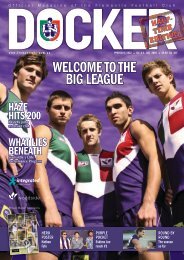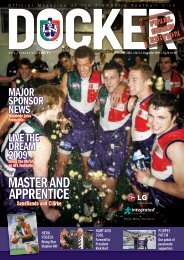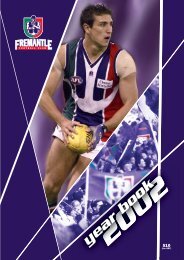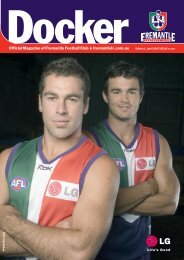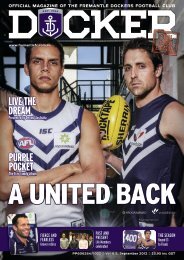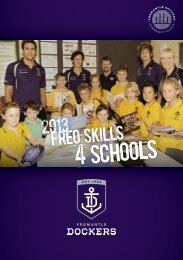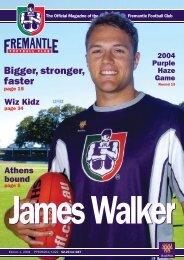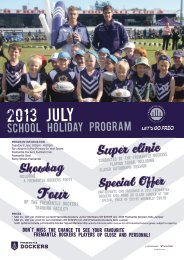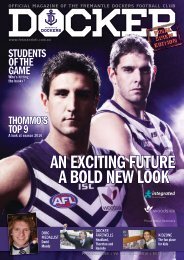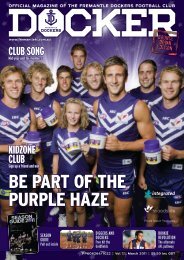FD36a Docker JUL05-REV.indd - Fremantle Football Club
FD36a Docker JUL05-REV.indd - Fremantle Football Club
FD36a Docker JUL05-REV.indd - Fremantle Football Club
Create successful ePaper yourself
Turn your PDF publications into a flip-book with our unique Google optimized e-Paper software.
Coachesdevelopment while they’re injured,” Eastaugh said.“It’s one of those fantastic roleswhere you never get bored because thereis always something happening.”And on the matter of winning and losingnow that he’s moved from player to coach?“It’s a little bit different when you’re coaching.You actually feel both highs and lows harder thanwhen you’re a player I think because you knowhow much planning and homework we do goinginto games. When it really works well it’s fantasticand there is no better feeling and it’s a differentemotion altogether than playing. When you haveyour losses you’re really super disappointed becauseyou put equal amount of work into those gamesas you do the wins and for it not to have workedas we would have liked is really disappointing.“I’m worse now after a loss than when I wasplaying… my wife Alex says that anyway,” he laughs.Kevin Ball – Skills Coach and BiomechanistFrom the Senior Coach: “I think accuracy isthe most important skill a player can have. Wehave seen the game evolve into a possessiongame and you will always have players on thelist that need to develop that to an acceptablelevel. Kevin teaches kicking, tackling andindividual skills and we’re confident that ourplayers are improving in those areas.”They say it’s not the number of possessionsyou get but what they do with them that’ll hurtthe opposition the most, so its little wonderclubs are investing so much time in teachingplayers the best way to use the ball and haveopened the doors to ‘biomechanics’.It was in the realms of the AFL tribunal thatthe term ‘biomechanist’ first snuck into commonfootball vocabulary. These human movementexperts were brought in to help prove a bump wasunavoidable or it was physically impossible forGuidingan arm to swing any other way but Senior CoachChris Connolly saw the potential for more.<strong>Fremantle</strong> is at the forefront of skilldevelopment in the AFL and is just one oftwo teams that have a biomechanist on staff(several others use consultants). Kevin Balljoined <strong>Fremantle</strong>’s coaching team in 2003,the second year of Chris Connolly’s tenure at<strong>Fremantle</strong>, after working together at Hawthorn.“I remember Chris wanted me to come downto the Hawks and give a lecture. I had everythingorganised and when I got there he said let’s go andget a coffee and we had a chat over lunch for an hourand at the end of it he said that was a job interview,‘are you keen to do some work with the Hawks?’“Chris has a really good scientificbrain and he saw that as an area where theclub could get an edge,” Ball said.After gaining a degree in Applied Scienceeamat Wollongong University he worked at theAustralian Institute of Sport for seven years beforemoving to Melbourne to complete his Masters atVictoria University and is currently completing aPhD. With significant experience in a variety ofOlympic sports the chance to utilise his skills inthe AFL was an opportunity too good to pass up.“Specifically I work on kicking andtackling. I co-ordinate the guys kickingprograms and also now have more to do withtheir individual skills across the board.”“Chris has always said that kicking is one of thetoughest sporting skills to master and he’s right.Firstly you have the ball drop onto the foot whichis a fine motor skill then you have a gross motorskill where you swing your leg through and there isno other sport that has really got that,” Ball said.“Serving in tennis also uses both motor skillsbut it’s a round ball and if the toss isn’t right youcan catch it and do it again but in footy you can’t.“The orientation of the ball is difficult infootball and you’re performing these skills on abig ground which means you’re under more fatiguethan most sports and also under the threat of beingtackled or bumped by an opposition player.”Tackling has also been a main focusfor Ball during his time at the club and ismodest in his assessment of <strong>Fremantle</strong> majorimprovement in that area of the game.“Brisbane brought in an idea that Chriswanted to implement called ‘crash tackles’where you take guys to ground. What I set aboutdoing was working hard on technique, a lotof guys will say tackling is about confidencebut what I’ve found it that if you’ve got goodtechnique then you do have confidence.”“When Josh Carr and Heath Black came intothe group this season their technique was quitedifferent so I worked with them to adjust that to getlower and closer to the body and they have beenoutstanding in their improvement. The style weemphasise is also beneficial for injury preventionbecause there’s not as much arm tackling and youuse your shoulder to get closer to the player andtherefore reduce shoulder injuries and the like.”Across the board <strong>Fremantle</strong> has seen an increasein their skill effectiveness but Ball believes thereis still much to learn and we’re only just starting tosee the benefits of the hard work from the players.“My aim is that you get the technique rightand you adapt that into training and then intogames and transfer all the way through.“It takes a few years to develop and you canstart to see that now. You can get some very goodshort term results but the longer the changestake the more stable they are so you find thatquick changes come back down quickly as wellso it’s a matter of patience and practise.”Ben Tarbox – Strength and Conditioning coachFrom the Senior Coach: “Ben comes from theWA Institute of Sport and is getting his headaround the fitness demands of AFL football butcertainly brings outstanding knowledge to ourclub and plays an important role at <strong>Fremantle</strong>.”After eleven successful years at the WestAustralian Institute of Sport (WAIS) theopportunity to develop and co-ordinate afitness programme for professional athleteswas too good to pass up for Ben Tarbox.“It is challenging and a big learning curvefor me coming into football particularly with thedemands that playing combined with the travelevery second week places on the players,” he said.As head of the strength and conditioningprogramme at WAIS he prepared someof Australia’s best athletes during fourOlympic campaigns and has broughtthat knowledge to <strong>Fremantle</strong>.“It has been absolutely fantastic so far,coming from amateur sport to professionalsport and an organisation like <strong>Fremantle</strong>that is so dynamic has been so much fun.“I really like working at the footy club andthink it has a really good feel about it. We hada good feel and nice culture at WAIS and I wasthinking it would be difficult to replicate that butit’s at least on a par, if not better here, because thereis so much diversity across the organisation.”Ben TarboxBall offers advice to Byron Schammer after a liftAs the club’s Strength and Conditioningcoach, Tarbox oversees the weights and fitnessprograms for every player and individualisesthese for optimum effect. He says players thathave been in the AFL system for sometimemostly require a steady maintenance of theirfitness levels while the younger boys are givenprograms to build body mass and strength.It’s a tough ask to accommodate 44 differentbody shapes, sizes and stages of development.While key position player Graham Polak wasadding eight kilograms to his frame duringthe pre-season Peter Bell’s programme had toaccommodate rehabilitation from off-seasonsurgery. To ensure the best results are achieved ina timely manner there is a strong union betweenseveral of the club’s key fitness staff includingTarbox and physiotherapist Jeff Boyle.“There is such a wide range of things thathappen in a two hour period during a game, thedemands on these guys are phenomenal. That isone of the most challenging things, getting theseguys fit enough to play the game but not doing toomuch so they’re fatigued going into the game.“The actual physiological demands of gamesand the effort they have to put in is far greater than Iexpected it to be. For example Matthew Pavlich runs14 kilometres a game and it’s at pace with contactand the need for accurate skill execution,” he said.“These guys run further than a city to surfevery week with contact. Most average peoplewho run the city to surf need a couple of weeksto recover whereas these guys are doing it everyweek at pace while bumping into each other.“Each week I get to know them a little bitbetter so you’re better able to identify theirneeds, modify their programs to suit them bothphysically and also mentally. I try and get afeel for what motivates them because I havefound that it is just as important as figuringout what they need physiologically.”After helping our Olympians bring back goldTarbox has lofty goals during his time at <strong>Fremantle</strong>.“When I joined the club I thought Iwant to be here for at least four years andin that time I want to help <strong>Fremantle</strong> win aPremiership,” he said with a steely resolve.fremantlefc.com.au July 2005 <strong>Docker</strong> 19



